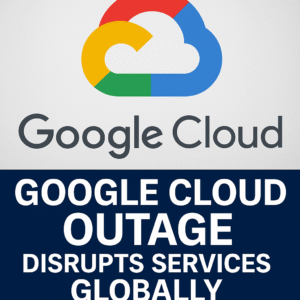Google Cloud Outages Disrupt Services Globally, Here’s What Happened

Google Cloud experienced a major outage today, disrupting numerous apps, websites, and services that rely on its cloud infrastructure. Users and businesses around the world reported service interruptions, slowdowns, and inaccessibility on key platforms powered by Google Cloud.
What Happened?

This morning, reports of Google Cloud services becoming unresponsive began flooding in. The affected regions include parts of North America, Europe, and Asia. According to Google’s official status dashboard, issues were reported with:
- Google Cloud Storage
- Google Compute Engine
- BigQuery
- Firebase
- Google Kubernetes Engine (GKE)
By mid-morning, developers and companies using apps running on Firebase or hosted on Google Cloud were experiencing loading errors, broken features, and database timeouts.
How Did It Impact Users?

Some major apps and sites that rely on Google Cloud also went down or become partially unavailable. These include:
App based startups
News websites
Educational Platforms
IoT services
Many users took to social media, particularly X , express their frustration. Hashtags like #GoogleCloudDown and #Firebase quickly started trending.
Google’s Response

Google acknowledged the issue on its Google Cloud Status dashboard. The company said engineers are investigating and working on a fix.
According to the latest update, services are gradually being restored, but some areas may still experience performance issues.
“We are aware of an issue affecting a significant subset of our customers and are actively working to restore normal service,” a Google spokesperson said.
Why Do These Outages Matter?

Google Cloud powers thousands of applications and services around the world. From streaming apps and productivity tools to enterprise software and gaming backends, an outage of this scale impacts users, developers, and entire industries.
Even a few minutes of downtime can result in lost revenue, disrupted communications, and a loss of customer trust for many companies.
What You Can Do
if your services are affected:
- Keep checking the Google Cloud Status Dashboard for updates.
- Avoid deploying new code or making server changes.
- Notify your users of potential disruptions.
- Back up any sensitive data if possible.
Final Thoughts
While cloud outages are rare, they highlight the importance of failure strategies and communication plans. As more companies move their operations to the cloud, resilience and transparency during outages become more important than ever.
1 thought on “Google Cloud Outage Hits Global Services: What Happened & How to Respond”